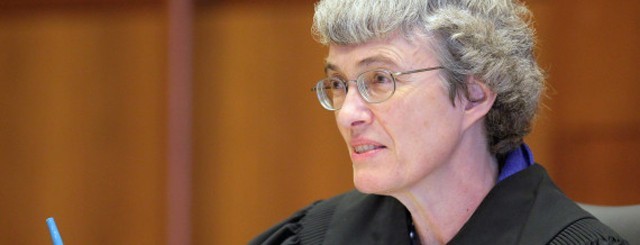A New Jersey judge on Friday ordered state officials to allow same-sex couples to marry starting October 21, saying the current civil union system unfairly deprives them of federal benefits available to married couples.
Judge Mary Jacobson in Mercer County Superior Court in Trenton issued the order, making New Jersey the first state to lift a ban on gay marriage as a result of the U.S. Supreme Court’s decision in June to strike down the federal law defining marriage as between a man and a woman.
“Same-sex couples must be allowed to marry in order to obtain equal protection of the law under the New Jersey constitution,” she wrote.
A spokesman for New Jersey Governor Chris Christie indicated the state would appeal but did not say whether it would seek a stay to stop the ruling from taking effect.
Hayley Gorenberg of Lambda Legal, one of the attorneys for the gay couples who brought the lawsuit, said they would fight the appeal “every step of the way.”
If Jacobson’s decision stands, New Jersey would become the 14th state to permit gay marriage. It is also legal in the District of Columbia.
The ruling highlights, once again, the shifting legal and social landscape when it comes to gay marriage. Polls have shown increasing public support for same-sex marriage, and civil rights groups have prevailed at a number of courthouses across the country. Ten years ago, no U.S. states permitted gay marriage.
On Friday, Exxon Mobil Corp said same-sex spouses would be eligible for company benefits in light of the Supreme Court’s decision to strike down the federal Defense of Marriage Act in June.
An Illinois judge also ruled on Friday that lawsuits challenging the state’s civil unions could move ahead, rejecting an attempt by several county clerks to have them dismissed.
Opponents of same-sex marriage reacted angrily to the New Jersey ruling, saying such an emotionally fraught issue should be left up to a voter referendum.
“It’s another example of judicial activism on steroids. It’s absurd,” said Brian Brown, head of the National Organization for Marriage, a group that believes marriage should be defined as a union between one man and one woman.
Last year, Christie vetoed a gay marriage bill passed by the Democrat-controlled state legislature. Lawmakers have until the end of the year to override the veto, but it is not clear that the majority has enough votes. Christie, considered a frontrunner for the 2016 Republican presidential nomination, has called for a referendum to decide the issue.
New Jersey gay rights groups immediately vowed on Friday to continue to press for an override vote. The appeals process is likely to last well into next year.
Across the country, the U.S. Supreme Court’s ruling that gay married couples must receive the same federal benefits, such as tax breaks, granted to heterosexual couples has emboldened advocates, who are pursuing lawsuits in federal as well as state courts.
“One of those cases is going to get to the Supreme Court sometime in the next few years,” said James Esseks, who oversees gay rights advocacy for the American Civil Liberties Union.
New Jersey’s civil union law, however, was especially ripe for a challenge because the state’s Supreme Court already ruled in 2006 that same-sex couples were entitled to the same rights as heterosexual married couples. That led the legislature to create civil unions as a way of ensuring equal treatment.
Friday’s ruling was part of a long legal battle over the state’s civil union law. When the Supreme Court invalidated the Defense of Marriage Act, however, the same-sex couples in New Jersey went back to court, arguing that civil unions could not guarantee equal rights because of the gap in federal benefits.
In a 53-page opinion, Jacobson agreed, stating that New Jersey same-sex couples in civil unions are now missing out on federal benefits they would otherwise be entitled to as a result of the Supreme Court’s action.
“These couples are now denied benefits solely as a result of the label placed upon them by the state,” she wrote.
Photo: Tony Kurdzuk
Author: Joseph Ax and Edith Honan
Publication: Reuters
Date: 27 September 2013

